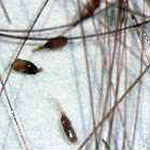Dear Dr. Rassman,
Thank you for having a site where a consumer can ask questions about there concerns and worries about hair disorders and hair systems. I am a professional cosmetologist of over 23 years. I specialize in non-surgical hair replacement and a retailer of fine wigs and hair pieces. http://www.afoxintl.com/ Over the years I have witness several women loose their hair, it appears to be widespread. Does not matter the ethic background, I have seen in all races. Although Dr. Rassman, I have noticed women of color experiece itchy scalp on the crown area. Not the typical cases of braid, ponytail, high lift colors and weaves. These ladies hairloss starts on the lower crown,but above the occipatal bone.
No medications, never braids-weaves or such. Starts itching in September and goes through winter months to about April, win hair starts to grow back. I have witness this with new clients who have come to me based on recommendation of being able to have the Growing Hand. During this winter dry period I use essential oils, olive oil, moisture conditioners with and without heat, tends to help stop iching somewhat. All have seen dermatologist…they prescribe Biotin and Nizoral, even as sugest to one fugal infection…strange she get fungal same time every year Sept to April. Afterward hair grows great in summer, no itching….What are your thoughts?

Without examing a person, it is difficult to blindly produce a diagnosis. Sound like the right treatments with oils and the like. The dermatologist joke is: “If it is dry, wet it! If it is wet, dry it!”
Fungal infections can cause itching and flaking but it requires the skilled eye of an experienced doctor.


